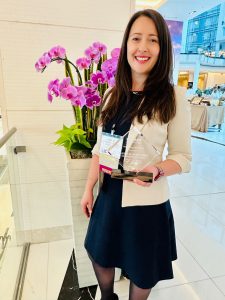 When it comes to making choices about nutrition and food safety, among other topics, it’s understandable that many consumers will seek out scientific information which shapes their decision-making process.
When it comes to making choices about nutrition and food safety, among other topics, it’s understandable that many consumers will seek out scientific information which shapes their decision-making process.
For example, someone who has read information about microplastics being released into food from plastic packaging may opt for food packaged in cardboard or alternative materials. This is called a nudge. However, sometimes the information provided can be misunderstood or have an unintended negative impact on consumer behavior.
In a recently published article for Applied Economics Teaching Resources (AETR), Dr. Olesya Savchenko, an Assistant Professor of UF Food and Resource Economics, and her colleagues present an interactive activity designed to help undergraduate students grasp the impact of scientific information on consumer behavior, as well as the potential for misunderstandings and negative reactions. In recognition of superior achievement in Agricultural and Applied Economics, this paper received the 2023 AETR Outstanding Article Award.
“Why is this a relevant/important topic for students to understand?”
Understanding the importance of scientific information is crucial for students because it can help them gain insights into how it shapes and influences various aspects of the world. While information is useful for making informed choices, it can also lead to negative consumer responses, even when the information provided wasn’t intended to convey a negative signal. We demonstrate how educators can utilize an in-class economic experiment to introduce the concept of a “sludge” – a small behavioral intervention that leads to unfavorable outcomes. This experiment allows students to explore the impact of a sludge and understand its implications. The step-by-step guide to a demand-revealing design, using a second-price, willingness-to-accept (WTA) auction, provides students with practical tools to assess preferences for tap water and bottled water when they receive information on total dissolved solids (TDS). We also show how instructors can introduce additional classroom discussion topics, such as comparing nudges and sludges, understanding the public response to tap water treatment, and exploring the role of safety information in shaping consumer responses.
“Why was this topic chosen, and how is it relevant across different localities and audiences?”
In our experiment, we used water as a product everyone is familiar with to illustrate the concepts of a nudge and sludge. However, the knowledge gained from this experiment is transferable to many other contexts. Considering the significance of nudges and sludges in diverse settings, classroom discussions can be easily extended to explore additional lessons from behavioral economics concerning the role of safety and environmental information in decision-making and policy formulation. By delving into these topics, students gain a deeper understanding of the complexities involved in decision-making and the potential consequences of various behavioral interventions. This knowledge equips students to analyze information critically, make more informed choices, and become thoughtful consumers in a world inundated with information and influences.
“How do the interactive methods of the experiment enhance the student learning experience?”
The in-class economic experiment offers a remarkably interactive and captivating approach to grasping the material. From my own experience, students thoroughly enjoy participating in activities like this, and they derive a wealth of knowledge from this hands-on instruction, far beyond what a standard lecture can provide. Not only do students gain insights into the influence of information on decision-making, but they also develop a deep understanding of how a second-price WTA auction works, an important concept in economics.
For detailed information on how to set up this classroom experiment to use with your own students, refer to the full article available here.
 1
1
